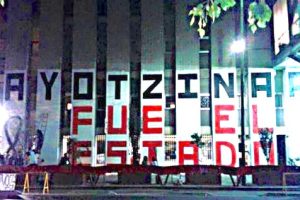Crisis and War here ♦ Mexican Ruling Class here ♦ El Salvador 1932 here ♦ USA Nurses Strike here ♦
Criticisms of the Article “Capitalist Crisis, Imperialist War, and Class Struggle”
First, the beginning quote is old.
A more current quote from a high-ranking military official, politician, or think tank stating the possibility of global war soon would have giving World War III the urgency it requires.
The subtitle should have been, “Local, regional and world wars inevitable under capitalism” instead of “War is fundamental to capitalism.”
The main reason NATO bombed Yugoslavia was to prevent the USSR from defending its sphere of influence.
Russian oligarchs. who stole most of USSR’s wealth, wanted to make Russia an appendage of US imperialism. Putin, representing imperial Russian rulers determined to resurge, dismantled their plans after rising to power in 2000.
US rulers then opted for military encirclement to contain Russia. Hence NATO expanded eastwards by incorporating seven Eastern European countries in 2004.
The second criticism concerns the statement: “The productive forces have developed so much that they can no longer return profits sustainably for their capitalist owners.”
This excludes the conscious human element. Capitalism’s crises are caused by its competitive nature, which forces capitalists to fight for maximum profits and greater market share. They invest in the productive forces to produce more, cheaper commodities – resulting in overproduction, depressions, and wars.
The third criticism is about the capitalist-imperialists’ fears of their rivals and of the working class.
Which is primary? History shows that the first is primary because they always resort to war. Making the second fear primary leads to the deadly assertion that this “holds back today’s imperialists from launching a full-scale World War III.”
Their fear of workers is proportional to the size of the revolutionary communist movement. In World War I it was almost nonexistent. World War II was different. The USSR-led international communist movement had great potential for worldwide revolutions.
Thus, the bosses needed to win masses of workers to anticommunist fascism. Germany, Japan, and Italy chose this path. The US rulers and allies – aided by the Comintern’s United Front line – used anticommunist bourgeois democracy to mobilize the masses to fight for their empire and profits.
Our period is like WWI: small communist forces internationally, yet workers not won ideologically to fascism or rabid anticommunism. Pre-revolutionary conditions exist now worldwide.
Despite the bosses’ fears, World War III is inevitable, imminent, and perhaps already raging in the US-NATO proxy war against Russia in Ukraine. It took several years for all the major imperialists powers to enter WWII after Germany, England and France declared war in 1939. Some historians claim WWII started with the Japanese invasion of Manchuria, 1931-1932.
Where will revolution happen? Lenin said at the weakest link of the imperialist chain: where revolutionary conditions exist and there is a Party capable of leading the masses to power. This made revolution in Russia during WWI possible.
Given the internationality of our Party, and the objective conditions worldwide, several communist revolutions are possible simultaneously. This could inspire workers in many other countries. The danger is real, but the opportunities are great. Our future is bright.
—Comrades in California (USA)

“Ayotzinapa Was the State”
Unity and Struggle Within the Mexican Ruling Class
I liked the article on Ayotzinapa in the last edition of Red Flag, but I would like to specify something else.
The article refers to “a fight among the Mexican capitalists. On one side, those who have been in power for generations (PRI-PAN) enjoying the wealth squeezed from the labor of millions of Mexican workers. On the other, capitalists who came to power recently (MORENA party and others).”
It isn’t “bosses who came to power recently” who lead Andrés Manuel López Obrador (AMLO) to the presidency. Yes, it is a dispute within the bourgeoisie for the surplus value extracted from the working class. The PRI-PAN rulers cynically promoted their own enrichment and that of capitalists related to them; with tremendous corruption, duping their own American partners who ended up giving their consent to the AMLO government, despite the Russian-Chinese affiliation of some of his consorts.
A consensus of capitalists, including billionaires like Carlos Slim, C. Hank Glez (Banorte) and other powerful capitalists are obviously there to further their interests. Many prominent former PRI members are in the government.
AMLO’s arrival restored credibility in elections and bourgeois institutions. He calmed the anger that exploded in protests in other countries. He “tied up the tiger” for them, as he had offered.
AMLO maintains wage slavery successfully, hooked into the North American region and taking good advantage of the US-China dispute.
The big capitalists have made arrangements with the AMLO government. Citigroup advertised that they would have no problem working with anyone who came. The export industry has been maintained and it has plans to expand. There is a group of “adversaries” facing AMLO. However, they are not the most powerful.
The report of the Commission for Access to Truth and Justice on the Ayotzinapa case does not go up the chain of command.
Alejandro Encinas, Undersecretary of the Interior, when presenting the Report, stated that no indications link former President Peña Nieto or General Cienfuegos with the disappearance of the 43 students and the murder of six others the same night. He blames representatives of the State.
The bourgeois state with AMLO is plugging the cracks through which mud and blood drip. It has been able (and not inept) to maintain and prolong the system of wage slavery, favored in foreign investment, less corrupt, and supporting exporters (foreign and national).
The State is an organ of oppression of one class over another. To overthrow and crush the current one, the working class needs to develop its general State (the ICWP).
As the article said, “Today as we commemorate the eighth anniversary of the 43 Ayotzinapa students, we must redouble our efforts to build a communist society without disappearances, racism, sexism, and exploitation.”
—Comrade in Mexico
Communists Led the 1932 Peasant Uprising in El Salvador
After a discussion with some members of the Red Flag collective, we concluded that the article “Fighting Racism in El Salvador” in the last edition of Red Flag did not mention that the leaders of the 1932 peasant uprising in El Salvador were openly communist.
Led by communists, the uprising was postponed for several days to gain more support within the army, since they had done consciousness-raising work among soldiers.
One factor that contributed to this uprising was the Great Depression of 1929, which hit the country hard. The Salvadoran Communist Party (PCS) was founded in 1930 when the Bolsheviks had a great international revolutionary communist influence.
They saw an opportunity to organize and take the mass discontent to a higher level, which became the peasant uprising.
We believe that knowing this part of history is fundamental for our Party. We evaluate past processes and see them, not as irrelevant, but as tools that will help us carry out our line and mobilize the masses for communism.
—Some comrades in the Red Flag collective

Minnesota Nurses Three-Day Strike
September 12—Fifteen thousand nurses in Minnesota (USA) went on strike against thirteen hospitals Monday morning. The three-day strike is mainly for better staffing and “letting members provide the quality of care they want to provide to patients,” a nurse explained.
The Minnesota nurses join many others, including hospital and school workers, who are striking over working conditions rather than traditional trade union demands over wages and benefits. They are refusing to allow the capitalist bosses to blame them for the problems created by capitalism’s drive for profit amidst a global crisis.
For example, over two thousand mental health professionals are on strike against Kaiser Permanente in California and Hawaii. Like Minnesota nurses, they say inadequate staffing deprives patients of care and prevents them from working effectively.
Teachers in Columbus, Ohio walked out against large class sizes and dilapidated schools. The school strike in Seattle, Washington (see page 1) focused on staffing to meet students’ needs.
It’s an uphill battle, to say the least. In capitalism, the class that owns and controls almost everything – including schools and hospitals – has the armed power of the state behind it. Capitalism’s golden rule is: “They who have the gold, make the rules.”
Communist revolution, in contrast, will put workers ourselves in control of our workplaces and everything else. We will collectively decide how to allocate labor and organize work. Before that happens, though, the armed power of workers and soldiers, led by communist ideas, must smash the capitalist state. No more “gold” to rule us!


